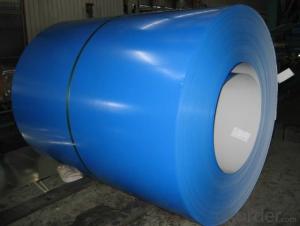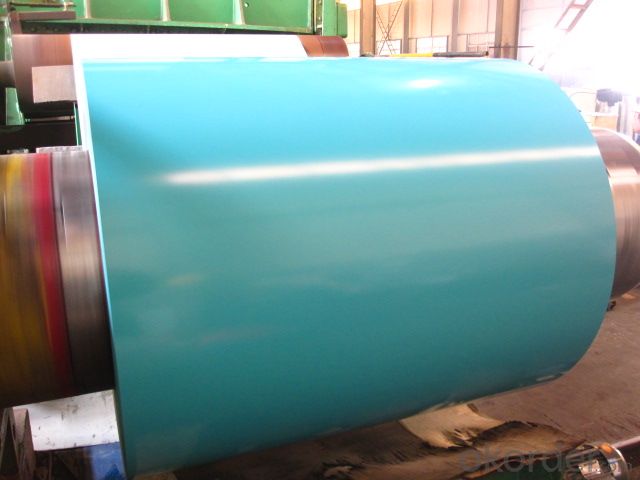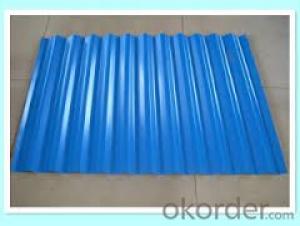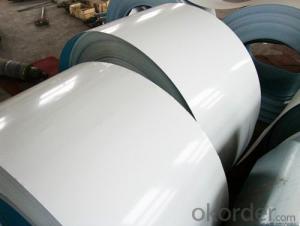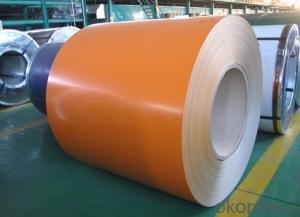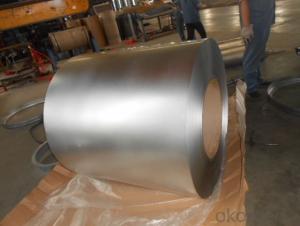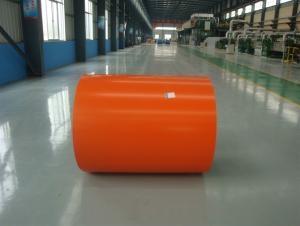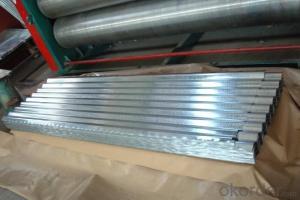PRE-PAINTED ALUZINC STEEL COIL WITH HIGH QUALITY
- Loading Port:
- Tianjin
- Payment Terms:
- TT OR LC
- Min Order Qty:
- 25 m.t.
- Supply Capability:
- 5000 m.t./month
OKorder Service Pledge
OKorder Financial Service
You Might Also Like
Painting steel is the product based on the metal sheet, of which surface is finally installed of the plastic film(PVC, PE) IN addition to being firstly covered with the coating and printed ink in. The coated layer of painting steel plate consists of chemical and filming layer, primer coated layer, pattern printed layer and surface coated layer. The top and back coating shall generally be the weatherproof paint, as well can be the application of the paint with special capabilities such as stain-resistant, self cleaning capability, high thermal resistance, antistatic capability, sterilizing capability, finger-print prevention and etc.
With GI(aluzinc) as base metal, after pretreatement(degrease and chemical treatment)and liquid dope with several layers of color, then after firing and cooling, finally the plate steel is called pre-painted galvanized (aluzinc)steel. Pre-painted galvanized steel is good capable of decoration, molding, corrosion resistance. It generally displays superior workability, durability and weather resistance.
Available specification:
PAINTING STEEL | |
BASE MATERIAL | HDGI, ALUZINC,CR |
GRADE | SGCC, DX51D,ASTMA653,EN10142,S350GD |
THICKNESS | 0.17-1.0mm |
WIDTH | 600-1250mm |
ZINC COATING | 60-200g/㎡ |
PAINT | PE,PVDF,SMP,HDP |
COILED | 508mm |
COIL WEIGHT | 3-6mt |
We can supply customers' with different specifications of the highest quality and lowest price.
Sincerely welcome to contact us for the future details if any item interest you ,and we will make every effort to assure that your requirements will be satisfied ,and we hope to establish long-term business relations with you on the basis of the equality and mutual benefit.
We are waiting for your feedback.
- Q: I want to know because I'm going to Hershey Park on Wednesday and Steel Force looks about the same size, so, I wanted to know. It's not that Steel Force is too big for me.
- steel force breaks the 200ft mark and is a steel out and back roller coaster. Tidal force is a water ride that is about 100 ft tall. If you can do Steel Force then you should be able to handle anything at Hersheypark. the on;y ride they have bigger is the Kissing Tower
- Q: Consider a steel rod of diameter 4.5 mm and length 3.3 m. If a compressive force of 4900 N is applied to each end, what is the change in the length of the rod?
- You need to calculate the stress on the rod and compare this with the mechanical properties of the steel. It would help if you were given more info. You will need to know something about the steel such as the yeild stress and E, the modulus of elasticity. The value of E is about the same for a wide range of steels. So long as the applied stress is below the yield stress, the strain is all elastic and is calculated from E. The real answer is that you can not answer this question since you do not know what the temperature is. Given the applied load, the change in length will be much different at room temperature than at 1500C.
- Q: Steel is no doubt a better constructin material but it is only in practice in developed country.i would like that we should high lights the benifits and negatives of steel to make the steel more clear as a construction material.Hope some expert to address this topicMD
- Steel Structure considered as the most efficient and fast in completion of any project, specially the high rise buildings, also the logistics during construction is less complicated than the normal methods, Steel Structure has so many advantages vs the disadvantages, and highly recommended for commercial buildings
- Q: How are steel coils processed and treated?
- Steel coils are processed and treated through a series of steps to ensure their quality and suitability for various applications. The process begins with uncoiling the steel coil, which involves removing the outer layers of protective wrapping and unwinding the coil. Once uncoiled, the steel is inspected for any defects, such as cracks or uneven surfaces. Next, the steel coil goes through a cleaning process to remove any dirt, oil, or rust present on its surface. This is typically done using a combination of chemical cleaning agents and mechanical scrubbing. After cleaning, the coil is rinsed and dried to prevent any residual moisture from causing corrosion. Once cleaned, the steel coil can undergo various treatments depending on its intended use. One common treatment is pickling, which involves immersing the coil in an acidic solution to remove impurities and scale. This process helps to improve the surface finish and prepares the steel for further processing. After pickling, the coil may be subjected to cold rolling, a process that reduces its thickness and improves its dimensional accuracy. Cold rolling involves passing the steel through a series of rollers at room temperature, gradually reducing its thickness and increasing its strength. This process also improves the surface finish of the steel coil. In some cases, the steel coil may undergo additional heat treatment processes, such as annealing or tempering. Annealing involves heating the coil to a specific temperature and then slowly cooling it, which helps to relieve internal stresses and improve its mechanical properties. Tempering, on the other hand, involves reheating the coil to a lower temperature and then cooling it rapidly. This process enhances the strength and toughness of the steel. Once the desired processing and treatments are complete, the steel coil may be coated or painted to provide additional protection against corrosion or to enhance its aesthetic appearance. Coating processes can include hot-dip galvanizing, electroplating, or applying organic coatings such as paint or powder coatings. Finally, the processed and treated steel coils are typically cut into specific sizes or shapes based on customer requirements. This can be done using various cutting methods such as shearing, slitting, or sawing. Overall, the processing and treatment of steel coils involve a combination of cleaning, pickling, rolling, heat treatment, coating, and cutting processes. These steps are carefully carried out to ensure the quality, strength, and suitability of the steel for its intended applications.
- Q: How are steel coils used in the manufacturing of construction cranes?
- Steel coils are used in the manufacturing of construction cranes to form the structural components, such as the boom, mast, and jib. These coils are processed and shaped through a series of cutting, bending, and welding techniques to create the strong and durable framework necessary for the crane's operation.
- Q: What are the different types of surface treatments for steel coils?
- Steel coils can undergo various surface treatments to enhance their appearance, protect against corrosion, and improve durability. Common treatments include: 1. Hot-dip galvanizing: Immersing steel coils in molten zinc creates a protective layer, offering exceptional corrosion resistance and resilience in harsh environments. 2. Electro-galvanizing: Electroplating a thin zinc layer onto the steel surface provides good corrosion resistance and enhances aesthetics. 3. Organic coating: Coating steel coils with organic materials like paints, lacquers, or polymer films offers corrosion, abrasion, and UV protection, while providing a wide range of color options. 4. Phosphating: Treating the steel surface with a chemical process forms a layer of phosphate crystals, improving coating adhesion and corrosion resistance. 5. Chromating: Also called passivation, this treatment involves applying a chromate conversion coating, enhancing corrosion resistance and offering a decorative finish. 6. Oiling: Applying a thin layer of oil to steel coils during storage and transportation prevents corrosion and can be easily removed before further processing. 7. Pickling: Immersing steel coils in an acid solution removes impurities and scale, improving surface finish and preparing the steel for subsequent processing or coatings. 8. Tin plating: Electroplating a layer of tin onto steel coils provides excellent corrosion resistance, solderability, and aesthetic appeal. These treatments are just a few examples of the many available for steel coils. The choice depends on specific application requirements, including desired appearance, corrosion resistance, and environmental conditions.
- Q: why were guns, germs and steel absent within America?
- i dont really understand this question but if it means to how it was before then it was absent because the native americans were not into technology so they obviously had no guns created that was something that they had traded to get from europe as for the germs i ddo not know about thta really except for if it means that common disease and one of the diseases most used in history books is malaysa from mosquitos but when they had traded with europe they got all sorts of diseases now for steel the only reason i remember them traveling for is for gold and i dont remember them ever looking for it until 13 colonies were established as you can see im not exactly sure about germs and steels but i know that the guns part is correct
- Q: i want to know if i should buy a set of acrylic tapers or steel. they r close in cost so it's not a money factor i want to know which work better and if there is a downside to either. thanks!
- It relies upon on your physique and what you desire. in case you physique is allergic to a minimum of one in all them you may would desire to chosen for yet another one. If this is not any longer allergic to any, than you need to use in spite of you like the main, in simple terms attempt the two.
- Q: will peircers use surgical steel? how do you know for sure what they are using?
- When you go to get your tongue pierced they will tell you exactly what their doing and what their using. And I had my belly button pierced, and my boyfriend has his tongue and eye brow pierced and it's all done with surgical steel. Piercers wont use anything but that.
- Q: What are the guidelines for handling damaged steel coils?
- The guidelines for handling damaged steel coils include assessing the extent of the damage, ensuring proper storage conditions, using appropriate lifting equipment, and implementing safety measures to prevent injuries or further damage. It is crucial to follow manufacturer recommendations and consult with experts in the field for specific guidelines based on the type and severity of the damage.
Send your message to us
PRE-PAINTED ALUZINC STEEL COIL WITH HIGH QUALITY
- Loading Port:
- Tianjin
- Payment Terms:
- TT OR LC
- Min Order Qty:
- 25 m.t.
- Supply Capability:
- 5000 m.t./month
OKorder Service Pledge
OKorder Financial Service
Similar products
Hot products
Hot Searches
Related keywords
